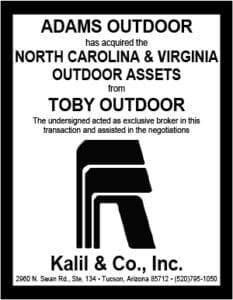
One of the most influential people in my sales career was Chris Lytle, a trainer/educator/mentor (InstantSalesTraining.com). Chris is a world class resource who primarily serves the radio industry. He has always given me remarkable insights, strategies, and ideas on how to sell more faster. I was unbelievably honored to be invited to his podcast to talk about how local media sales (both radio and OOH) have evolved in the last few years. Here are some excerpts of our discussion:
1) Programmatic sales
As programmatic ad buying has come on strong, a lot of sales reps think it’s going to replace them. Quite the opposite. It will build demand for reps who become a sustaining resource for their clients, through advertising insights, market intel, etc. Think of trading of stocks/bonds, buying real estate, or purchasing travel tickets; you can complete any of these online. But this automation has led to a proliferation of financial planners, savvy real estate professionals, and travel experts because you still need a personal resource who understands your needs and tailors a solution. Because reps are “INTRAprenuers”, they invest 3-5% of their gross income in building their value through knowledge, training, and fresh ideas. INTRAprenuers will become more valuable and sought-after than ever in the new world.
2) Revenue Channels
It seemed if you weren’t a conventional, somewhat large advertiser who was going to do business the way it had always been done, OOH companies had no time for you. You weren’t big enough or sophisticated enough. There is room for everybody.
Clear Channel Outdoor is beginning an initiative to sell direct to smaller local advertisers. If you are a single location hardware store and want the poster down the street, you input your information. It sells you the billboard and provides turnkey creative support. You put in your credit card and you’re done. If out of home can develop more media channels like this, they can save the big guns – the sales executives – for the high value prospects. This can also be a source of general leads. For example, a 12-store hardware chain may make an initial inquiry using this platform not realizing they should be serviced by a sales rep.
A former manager said, “If we sell these billboards one at a time, we’re all going to go broke.” There’s a market for selling them one at a time, you just need to allocate resources appropriately.
3) Work from home.
The world has learned volumes about working from home. During COVID, a very large broadcast group sent their sales staff home, and discovered the reps became more productive. They’re not bringing their salespeople back into the office. This is very unfortunate for several reasons; the entire interaction, collaboration, belonging to a team is critical for rep growth and retention. Productivity will flow from a strong sales culture. A rep working from home has little loyalty to any one company because they already feel detached.
4) Job Sharing
Many employers are afraid of job shares. Often the whole is bigger than the parts. I’ve seen several instances where two reps working half time on a book of business will generate more combined sales than either one of the two reps would individually. If you have a highly productive salesperson that will only give you 50% of their time, why would you deny your organization their talents? Managers are afraid of job-sharing arrangements because they don’t have accountability systems in place to adequately monitor and manage them.
5) Compensation
I have had a lot of financial success being compensated on straight commission, however, that model is not ideal. It gives the reps permission to not sell. If you don’t get paid when you don’t sell, then it’s up to you to decide whether you sell or not. As a company you’re not buying sales, your buying sales calls/contacts/relationships. Compensate your reps a livable wage and incentives to sell more, faster. Tie their key performance indicators (their critical activity i.e.: number of presentations, number of data gathering calls, etc.) to their compensation. You must have an adequate CRM system to track and monitor progress in order to coach them to success.
Competitive sales advantages are hard to achieve. The Ultimate Out of Home Sales Guide systematically guides you through heat-seeker prospecting, critical data gathering, idea generation, structuring killer proposals, making compelling presentations and a client service guarantee that assures a contract renewal.It is a great business tool which includes sample contracts and forms, and a complete account collections process. Get you copy of The Ultimate Out of Home Sales Guide before your competitors do.
[wpforms id=”9787″]

















